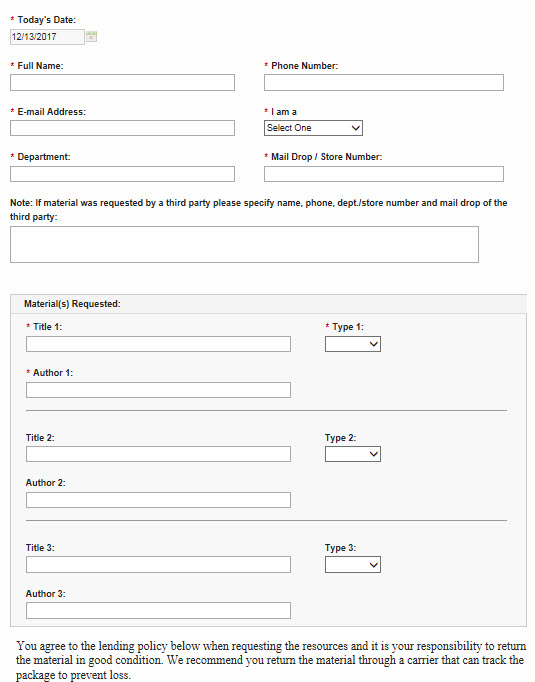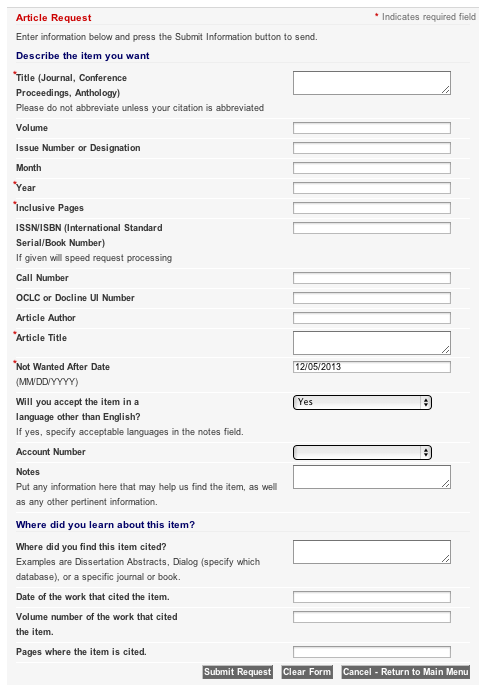
A library request is a request for a library item that is not currently available at the library you are visiting. Libraries can typically fulfill requests for books, articles, DVDs, CDs, and other materials.
There are two main types of library requests:
- Interlibrary Loan (ILL): ILL requests are for materials that are not owned by the library you are visiting. ILL requests are typically fulfilled by borrowing the item from another library.
- Holds: Holds are for materials that are owned by the library you are visiting, but are currently checked out or otherwise unavailable. When you place a hold on an item, you will be notified when it is returned to the library and available for pickup.
Why Use Library Requests?
There are many reasons why you might want to use library requests. For example, you might use library requests to:
- Get access to materials that are not owned by your local library
- Get materials that are currently checked out or otherwise unavailable at your local library
- Borrow materials from other libraries without having to travel to those libraries
- Get materials delivered to your home or office
How to Make a Library Request
The process for making a library request varies depending on the library you are using. However, there are some general steps that you can follow:
- Search the library catalog to see if the item you want is available. If the item is not available, you will typically see a button that says "Request" or "Place Hold."
- Click on the "Request" or "Place Hold" button. You will then be asked to provide some information about yourself and the item you are requesting.
- Submit your request. You will typically receive an email or phone call when your request is ready to be picked up.
Tips for Making Library Requests
Here are some tips for making library requests:
- Be as specific as possible when describing the item you are requesting. This will help the library staff to find the item you are looking for more quickly.
- If you are not sure what you are looking for, ask a librarian for assistance. Librarians are experts in helping people find information and resources.
- If you need the item by a specific date, let the library staff know. They will do their best to fulfill your request by that date.
Benefits of Using Library Requests
There are many benefits to using library requests. Some of the benefits include:
- Convenience: Library requests are a convenient way to get access to materials that you need, even if they are not available at your local library.
- Cost savings: Library requests are typically free or very low cost. This can save you a lot of money, especially if you need to borrow a lot of materials.
- Access to a wider range of materials: Libraries have access to a wide range of materials, including books, articles, DVDs, CDs, and more. By using library requests, you can access materials that you would not otherwise be able to get.
Examples of Library Requests
Here are some examples of library requests:
- Requesting a book that is not owned by your local library
- Requesting a book that is currently checked out at your local library
- Requesting an article from a journal that is not owned by your local library
- Requesting a DVD that is currently checked out at your local library
- Requesting a CD that is not owned by your local library
Conclusion
Library requests are a convenient and cost-effective way to get access to the materials you need. Libraries typically offer a wide range of materials, including books, articles, DVDs, CDs, and more. By using library requests, you can access materials that you would not otherwise be able to get.
Additional Considerations
In addition to the benefits and examples of library requests listed above, there are a few other things to keep in mind:
- Processing time: It may take some time for your library request to be processed. The processing time will vary depending on the library and the type of request.
- Picking up your request: Once your request is ready, you will typically need to pick it up from the library in person. However, some libraries offer delivery options.
- Renewing your request: If you need to keep the item you requested for longer than the initial loan period, you may be able to renew your request. However, there is no guarantee that your renewal request will be granted.
Overall, library requests are a valuable resource that can help you to get access to the materials you need. If you have any questions about library requests, please ask a librarian for assistance.
WebRequests is an elegant and simple HTTP library for Python, built for human beings. Behold, the power of Requests : >>> r = requests . get ( 'https://api.github.com/user' , auth = (. WebThe urllib.request module defines functions and classes which help in opening URLs (mostly HTTP) in a complex world — basic and digest authentication, redirections,. WebIf you want, you can send strings to be received as files: >>> url = 'https://httpbin.org/post' >>> files = {'file': ('report.csv', 'some,data,to,send\nanother,row,to,send\n')} >>> r =. WebWhen you make a request to a server, the Requests library make an educated guess about the encoding for the response, and it does this based on the.
How to Request Materials Online at the Library of Congress

Source: Youtube.com
Library Request Instructions

Source: Youtube.com
What Is A Library Request, How to Request Materials Online at the Library of Congress, 4.67 MB, 03:24, 6,945, Library of Congress, 2017-12-11T15:26:35.000000Z, 2, Creating a library request form, 682 x 535, jpg, , 3, what-is-a-library-request
What Is A Library Request.
This video demonstrates how to request materials online through the Library of Congress catalog.
For transcript and more information, visit loc.gov/today/cyberlc/feature_wdesc.php?rec=8131
What Is A Library Request, WebThe urllib.request module defines functions and classes which help in opening URLs (mostly HTTP) in a complex world — basic and digest authentication, redirections,. WebIf you want, you can send strings to be received as files: >>> url = 'https://httpbin.org/post' >>> files = {'file': ('report.csv', 'some,data,to,send\nanother,row,to,send\n')} >>> r =. WebWhen you make a request to a server, the Requests library make an educated guess about the encoding for the response, and it does this based on the.

Creating a library request form - Source: jotform.com

Free Library Book Request Form Template | 123FormBuilder - Source: 123formbuilder.com

Request an Article from the Library Service Center | Duke University Libraries - Source: library.duke.edu
What is ask a librarian realpython.com › python-requestsPython's Requests Library (Guide) – Real Python
What is ask a librarian The Requests library is the de facto standard for making HTTP requests in Python. It abstracts the complexities of making requests behind a beautiful, simple API so that you can focus on interacting with services and consuming data in your application. Purpose of a library.
Purpose of a library
Purpose of a library What is a library used for making network requests.
What is a library used for making network requests
What is a library used for making network requests What is requests library used for.
.
What is requests library used for
What is requests library used for What is a requests library.
.
What is a requests library
What is a requests library What is requests library used for.
docs.python-requests.org › en › latestQuickstart — Requests 2.32.3 documentation
Eager to get started? This page gives a good introduction in how to get started with Requests. First, make sure that: Requests is installed. Requests is up-to-date. Let's get started with some simple examples. Make a Request ¶. Making a request with Requests is very simple. Begin by importing the Requests module: >>> import requests. .
datagy.io › python-requestsPython Requests Library: A Guide • datagy
The Python requests library is a Python library that handles making HTTP requests. The library is well known for being simple and elegant, by abstracting away much of the complexity of working with HTTP requests. .
.
.
.
docs.python-requests.org › en › latestRequests: HTTP for Humans™ — Requests 2.32.3 documentation
Requests is an elegant and simple HTTP library for Python, built for human beings. Behold, the power of Requests: .
.
.
pypi.org › project › requestsrequests · PyPI
Requests is a simple, yet elegant, HTTP library. >>> import requests >>> r = requests.get('https://httpbin.org/basic-auth/user/pass', auth=('user', 'pass')) >>> r.status_code 200 >>> r.headers['content-type'] 'application/json; charset=utf8' >>> r.encoding 'utf-8' >>> r.text '{"authenticated": true, ,' >>> r.json() {'authenticated': True, ...} .
www.w3schools.com › python › module_requestsPython Requests Module - W3Schools
Definition and Usage. The requests module allows you to send HTTP requests using Python. The HTTP request returns a Response Object with all the response data (content, encoding, status, etc). Download and Install the Requests Module. Navigate your command line to the location of PIP, and type the following: .
www.geeksforgeeks.org › python-requests-tutorialPython Requests Tutorial - GeeksforGeeks
Python Request Library is a powerful tool for making HTTP requests and interacting with web APIs. In this tutorial, we covered the basics of sending GET and POST requests, handling parameters and headers, and managing response data. .
What is ask a librarian.
Post a Comment